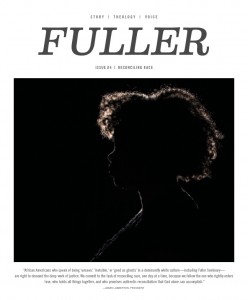 Symbols of Movement from Suffering to Hope
Symbols of Movement from Suffering to Hope
The power of a march is based in unity of purposeful action. Whether composed of a mob, an invading army, or nonviolent neighborly activists, a march—as opposed to a panel, a classroom, or a conference—is a collective intention to put feet to words. It is a potent symbol in the Christian tradition, old as Jericho, where impenetrable walls of injustice were toppled by obedient marchers armed with silent prayers, trumpet blasts, a few well-timed shouts, and the Lord God Jehovah in their midst.
Bridges are often chosen as staging points for marches because they are architectural icons that symbolize change. Those we’ve chosen to illustrate here are characteristic to each city: Selma, Charleston, Sacramento, and Pasadena. We’ve used these images to imply a narrative arc from suffering to hope, as Romans 5:4 describes. Bridges have deep, multifaceted meanings in many cultures, and are often chosen as locations for symbolic actions from suicides to proposals of marriage.
Our marchers—William E. Pannell, Harriet Tubman, Glen Stassen, James Earl Massey, Martin Luther King Jr., Sojourner Truth, Rosa Parks, and Dietrich Bonhoeffer—never linked arms or crossed the same bridge. They have, however, gone before us in the faith, embodying Christ. In this way, they marched together every day of their lives. This great cloud of witnesses are too many to include here, growing daily: William Wilberforce, Yuri Kochiyama, Clementa Pinckney, Óscar Romero, Kim Dae-jung, Richard J. Mouw, Pope Francis, Brenda Salter McNeil, Liu Xiaobo, José Arreguín—all are hinted at by the unfinished drawings at the left and right of our marchers. The lives of these leaders, living and past, teach us when to be silent, when to pray, when to lock arms, when to stand firm, and when to march. They are among the council of many, from whom the Scriptures say we are to derive wisdom in the day of trouble.
—Editor in Chief Lauralee Farrer, illustrations by Denise Lousie Klitsie
+ Quotes from the “Do Black Lives Really Matter?” panel—sponsored by the ASC Diversity Committee and the Black Seminarians Council—and from the Fuller Forum are scattered throughout this section. The Fuller Forum is available in its entirety online.
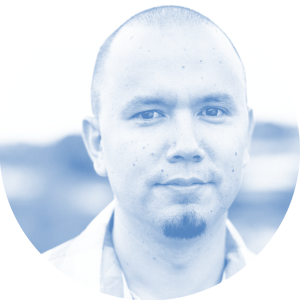 “There can be no reconciliation without honest conversation. Don’t underestimate the power of bringing up an issue you have with someone else and then actually talking with them about it. Some of my greatest friendships are with people to whom I can say, ‘You hurt me’ or ‘I disagreed with that.’ Telling the truth, though risky and painful, is the mark of a healthy relationship. But if there’s no relationship, there’s nothing to reconcile!
“There can be no reconciliation without honest conversation. Don’t underestimate the power of bringing up an issue you have with someone else and then actually talking with them about it. Some of my greatest friendships are with people to whom I can say, ‘You hurt me’ or ‘I disagreed with that.’ Telling the truth, though risky and painful, is the mark of a healthy relationship. But if there’s no relationship, there’s nothing to reconcile!
“Conversely, there have been many times when I kept silent about feeling hurt or disagreeing with people whose opinion matters to me—even though I was hurt and I did disagree. In those situations, my silence communicated that I was fine with whatever had been done or said. My silence sent a message that the risk of conflict outweighed the potential benefits of truthtelling and reconciliation. Avoiding conflict comes naturally to me, but not everyone has the privilege of sidestepping conversations about race.
“For those of us who are not African Americans, our silence on issues of racial justice speaks volumes. Not only have we missed opportunities to stand with the victims of systemic violence, we have shielded our friends and families from the knowledge that black lives matter to us, not just in theory, but personally. It’s one thing to condemn the violence, but another thing to confess the inadequacy of our response to it, including our failure to break this cycle. We can’t understand what went wrong leading up to the loss of life without looking at what has gone wrong in our response to these losses.”
+ Dan Stringer is a third-year MDiv student from Honolulu, Hawaii, pursuing an emphasis in Asian American Contexts. Find him @StringerDan and danstringer.net.
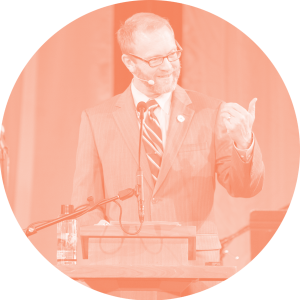 “Confession is somehow about justice; it’s about our healing but ultimately for the healing of the world. Walter Brueggemann has taught us that we, like the Israelites, find ourselves in bondage to the Empire all around us, living under the power of what he calls the royal consciousness. This is a consciousness marked by triumphalism and oppression. The Empire shapes our consciousness and defines reality for us; it wants to convince us that might makes right and it’s all business as usual. ‘There’s nothing wrong here; there’s nothing to see. Put down your cell phones and recording devices; don’t you know we’re just trying to keep you safe?’ This is the royal consciousness, and it creates a kind of numbing marked by affluence, oppressive social policy, and static religion. We are lulled by affluence to the point we can’t notice our own pain. We can’t hear the cries of the marginal anymore—we hear them as troublemakers, looters, not people in real pain striking out wildly like a man punching in the dark an enemy he can’t see. And we can’t be challenged by a truly free God; instead we domesticate God and perhaps baptize him in the rivers of nationalism. Often the disclosing of a secret, or what we might call a confession, is the first sign of anguish, a sign that not all is right with the world. And in these confessions we begin to dismantle the numbness of the ‘royal consciousness’ and we start to shine a little light into some dark and numb places. There God can spark our imaginations to envision an alternative community, an alternative kingdom, and a world where we can join with the psalmist in saying, ‘When I kept quiet, my bones wore out; I was groaning all day long—every day, every night! Because your hand was heavy upon me. My energy was sapped as if in a summer drought. So I admitted my sin to you; I didn’t conceal my guilt. “I’ll confess my sins to the Lord,” is what I said. Then you removed the guilt of my sin.’
“Confession is somehow about justice; it’s about our healing but ultimately for the healing of the world. Walter Brueggemann has taught us that we, like the Israelites, find ourselves in bondage to the Empire all around us, living under the power of what he calls the royal consciousness. This is a consciousness marked by triumphalism and oppression. The Empire shapes our consciousness and defines reality for us; it wants to convince us that might makes right and it’s all business as usual. ‘There’s nothing wrong here; there’s nothing to see. Put down your cell phones and recording devices; don’t you know we’re just trying to keep you safe?’ This is the royal consciousness, and it creates a kind of numbing marked by affluence, oppressive social policy, and static religion. We are lulled by affluence to the point we can’t notice our own pain. We can’t hear the cries of the marginal anymore—we hear them as troublemakers, looters, not people in real pain striking out wildly like a man punching in the dark an enemy he can’t see. And we can’t be challenged by a truly free God; instead we domesticate God and perhaps baptize him in the rivers of nationalism. Often the disclosing of a secret, or what we might call a confession, is the first sign of anguish, a sign that not all is right with the world. And in these confessions we begin to dismantle the numbness of the ‘royal consciousness’ and we start to shine a little light into some dark and numb places. There God can spark our imaginations to envision an alternative community, an alternative kingdom, and a world where we can join with the psalmist in saying, ‘When I kept quiet, my bones wore out; I was groaning all day long—every day, every night! Because your hand was heavy upon me. My energy was sapped as if in a summer drought. So I admitted my sin to you; I didn’t conceal my guilt. “I’ll confess my sins to the Lord,” is what I said. Then you removed the guilt of my sin.’
“The therapy room may have become the new confessional booth, and therapists in some way may be serving as secular pastors. We create space for people to speak their truths, to share their secrets, to confess what has been done to them and what they have done to others—to lament, to grieve, to cry out to others, to say that all is not right with the world. But I believe that as important as therapy can be to some people, as a Christian it is ultimately the work of the church to create space for this kind of truth-telling and confession and subversive obedience. And these confessions are not just about individuals in the church but secrets that the church has kept. We have secrets to tell about what we have done and about what we have left undone. We have confessions about how we have not loved our neighbors as ourselves.”
+ Brad D. Strawn is the Evelyn and Frank Freed Professor of the Integration of Psychology and Theology in the department of clinical psychology at Fuller. Watch Dr. Strawn’s full talk at the 2015 Fuller Forum here.
 “If there were images of Jesus as a black man, a Latino, an Asian, it would be very encouraging. A lot of African Americans who are not Christians think of Christianity as the white man’s religion and the Bible as a tool to condone slavery. But what if they realized that people in the Bible actually look like us? Then it would be easier to believe that Jesus came to save and not to enslave. The devil is in those gaps. The devil is in the silences. The evangelical church should have more conversation—not just when something happens in the news and everything is catching fire and everybody feels they have to respond. This should be a constant conversation, especially at an institution that is diverse like Fuller.
“If there were images of Jesus as a black man, a Latino, an Asian, it would be very encouraging. A lot of African Americans who are not Christians think of Christianity as the white man’s religion and the Bible as a tool to condone slavery. But what if they realized that people in the Bible actually look like us? Then it would be easier to believe that Jesus came to save and not to enslave. The devil is in those gaps. The devil is in the silences. The evangelical church should have more conversation—not just when something happens in the news and everything is catching fire and everybody feels they have to respond. This should be a constant conversation, especially at an institution that is diverse like Fuller.
“If I live in a context of having people generalize and make assumptions about me all the time, how dare I look at somebody and generalize? I know some really good white people. I know some really good Asian people. I know some really good Latino people. We want to treat other people the way we want to be treated, so how dare I do the thing that was done to me? It just perpetuates stereotypes.
“We are all a part of the body of Christ, and if part of the body is suffering, we are all suffering. We have this impression that we are functioning well because we are part of this community or that community, but each church is a part of the body. We have to talk about things that make us uncomfortable, and even want to fight each other—we have to bridge those gaps.”
+ Dei Selah Thompson, currently a student at Fuller in the Master of Divinity program with a concentration in worship, theology, and the arts, is on staff at Fuller processing student applications in the Office of Admissions.
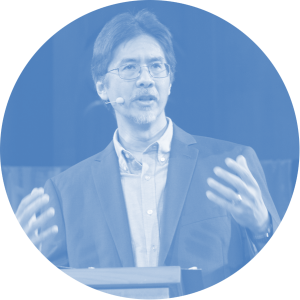 “The moral core of neighborliness—the embrace of otherness in an attitude of openness and fidelity—has normative developmental roots in early family relationships, and this has important implications for practical ministry and our shared narratives as a church.
“The moral core of neighborliness—the embrace of otherness in an attitude of openness and fidelity—has normative developmental roots in early family relationships, and this has important implications for practical ministry and our shared narratives as a church.
“The kind of neighborliness envisioned by the parable of the Good Samaritan requires the imagination to see beyond our taken-for-granted in-group loyalties and the self-righteous and the self-protective interpretations that support them. Unfortunately, we simply can’t assume that every child of God operates out of a robust ‘engagement ethic’ or ‘imagination ethic.’ When God’s law and current events are read through the lens of an implicit (and quite possibly unrecognized) safety ethic, imagination is being constrained by survival needs. That deficit of imagination is not going to be fixed by taking the right seminary class. To my mind two things are needed: First, from a congregational standpoint, we need a vision of marriage and family ministry that understands the role parents play in the moral development of their children—and that’s not just drilling kids on Bible verses or teaching them principles of behavior. It’s helping parents and all the adults in the community learn an attentive listening stance toward children, the better to foster the pro-social moral emotions that characterize a community of neighborliness. Second, that vision needs to be organically related to a shared narrative in which we, as God’s people, know ourselves to be living in the presence of a God who still speaks, and who still calls to relationship, to conversation, and to imagination. It’s an Old Testament theme that adults carry the stories of the community and repeat them to their children, and as they do so, they remain in a listening stance towards God and towards their children both—open to the twists and the turns of the story. One hopes that the listening of one generation will encourage the listening of the next and that together the generations can form a just and loving community that keeps listening attentively—always attentively—for the voice of God who summons.”
+ Cameron Lee is professor of marriage and family studies in the department of marriage and family in Fuller’s School of Psychology. Watch Dr. Lee’s full talk at the 2015 Fuller Forum here.
+ The crossing of the Edmund Pettus Bridge (named for a confederate general and grand dragon of the Ku Klux Klan) in Selma, Alabama, was part of a march to Birmingham in 1965 to secure voting rights for African Americans. It ended with armed policemen attacking peaceful protestors with billy clubs and tear gas, a shameful event that came to be colloquially known as “Bloody Sunday.” The historic gathering on the same bridge fifty years later, marked by a presidential address, was a reassertion of a commitment to the reconciling of race and the sentiment “we shall overcome someday.”
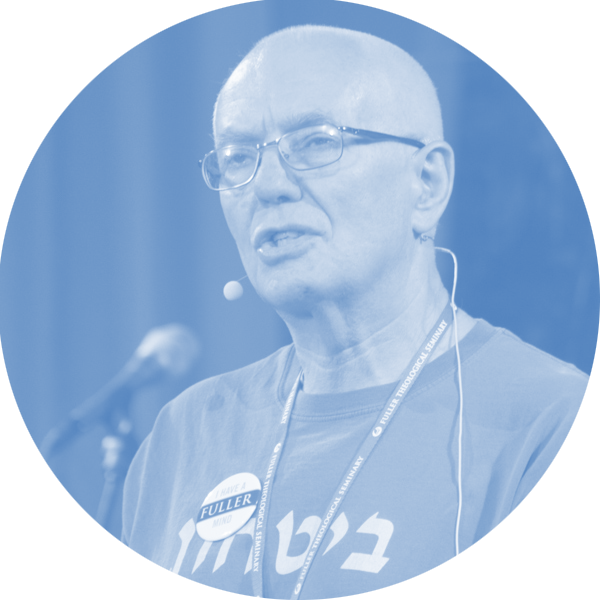 “Praying ‘Come, Lord Jesus’ is a serious prayer, and it’s a worrying one. If you ask whether we are more in the position of the martyrs in Revelation 6, more in the position of a subordinate nation like the Jewish people in Jesus’ day, more in the position of the little Christian communities like the ones at Laodicea and Pergamum to whom Revelation was written, or whether we’re more in the position of the Roman imperial superpower that controlled the everyday destiny of God’s people, then the answer is we are the Romans. We are the superpower. We are the people the widow in Luke 18 prays against, the people the martyrs pray against. Praying for Jesus to come is to pray for our judgment, so our prayer needs to be a prayer of repentance. We can’t help being members of a superpower, so we’d better plead for mercy.
“Praying ‘Come, Lord Jesus’ is a serious prayer, and it’s a worrying one. If you ask whether we are more in the position of the martyrs in Revelation 6, more in the position of a subordinate nation like the Jewish people in Jesus’ day, more in the position of the little Christian communities like the ones at Laodicea and Pergamum to whom Revelation was written, or whether we’re more in the position of the Roman imperial superpower that controlled the everyday destiny of God’s people, then the answer is we are the Romans. We are the superpower. We are the people the widow in Luke 18 prays against, the people the martyrs pray against. Praying for Jesus to come is to pray for our judgment, so our prayer needs to be a prayer of repentance. We can’t help being members of a superpower, so we’d better plead for mercy.
“Our prayer needs to be prayer that takes up the prayer of the widow and the prayer of the martyrs—not because we’re in their position, but because we commit ourselves to identifying with them in being concerned for justice. Remember that justice requires the activity of God, and its achievement belongs to the End. Our action will achieve little if it’s not accompanied with as much energy given to the kind of prayer the widow prayed and the martyrs prayed and the Israelites prayed in the Psalms.”
+ John Goldingay is the David Allan Hubbard Professor of Old Testament in the School of Theology at Fuller. Watch Dr. Goldingay’s full talk at the 2015 Fuller Forum here.
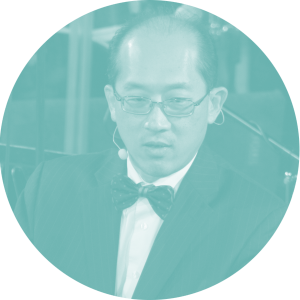 “God’s response to the domination systems of injustice, slavery, and calculated payments is to give—to give of God’s self, to give of God’s Son, and to generously pour of God’s Spirit into every heart. God’s response is to empower not a corporate capitalism but an ecclesial communalism, to propel not an ideology of the market but strange tongues that herald and inaugurate the coming reign of God, to enable not modern individualism but neighborly other-orientation, to sustain not human armies but a flourishing creation where the lion shall lie down with the lamb, to legitimate not the entitlements of exceptionalism but a fellowship of the Spirit in which ‘the least of these’ are the most exceptionally graced, and those who are deemed most dispensable are indispensable. Come, Holy Spirit!”
“God’s response to the domination systems of injustice, slavery, and calculated payments is to give—to give of God’s self, to give of God’s Son, and to generously pour of God’s Spirit into every heart. God’s response is to empower not a corporate capitalism but an ecclesial communalism, to propel not an ideology of the market but strange tongues that herald and inaugurate the coming reign of God, to enable not modern individualism but neighborly other-orientation, to sustain not human armies but a flourishing creation where the lion shall lie down with the lamb, to legitimate not the entitlements of exceptionalism but a fellowship of the Spirit in which ‘the least of these’ are the most exceptionally graced, and those who are deemed most dispensable are indispensable. Come, Holy Spirit!”
+ Amos Yong is director of the Center for Missiological Research and professor of theology and mission in the School of Intercultural Studies. Watch Dr. Yong’s full talk at the 2015 Fuller Forum here.
 “Segregation in the church today is heresy. Where is the togetherness? Where is the unity? Where is the Body of Christ? If you are not willing to leave the safety of your community to march with us or to stand with us in solidarity when the cameras are off, how do I know you care? How do I know that you have a deep concern for black youths who are being killed every week in the streets? How can I know unless you show me?
“Segregation in the church today is heresy. Where is the togetherness? Where is the unity? Where is the Body of Christ? If you are not willing to leave the safety of your community to march with us or to stand with us in solidarity when the cameras are off, how do I know you care? How do I know that you have a deep concern for black youths who are being killed every week in the streets? How can I know unless you show me?
“We need a unity that goes across every kind of dividing line because that is the perfect will of God—that we be one in the body of Christ. Because of the silence of the evangelical church in the past, we need a strong opposition today to racism in every form. We need that strong position from our church leaders. What of those who have perpetrated racism in the past? There needs to be an admittance of that reality, repentance of that reality, and restitution! Don’t just say, ‘What can we do to fix it? What can we do to set it right? What can we do to bring justice?’
“There are many causes at work in the context of police violence, but the undeniable reality is that race is part of the equation. We see and hear stories of racism across the nation, we continue to hear black stories of pain, and we continue to see black bodies lying in pools of their own blood—that should speak to us!”
+ Caleb Campbell is a first-year student in the MDiv program, a youth minister at Southside Christian Palace Miracle Center, a published author, and attended the conversation mentioned at the beginning of President Labberton’s article.
+ In June of 2015, thousands joined hands to form a human chain across Charleston, South Carolina’s iconic Arthur Ravenel Jr. Bridge. They were a witness of solidarity with the congregation and families of the “Charleston Nine”—murdered at a Wednesday night Bible study at Emanuel AME Church. The demonstration, called the “Bridge to Peace,” was an ambitious plan to make a human chain across the massive cable-stayed bridge spanning the Cooper River. Some 3,000 people were required, and—to the surprise of organizers—many more joined. Signs defining the intentions of the marchers quoted Martin Luther King Jr.: “Hate cannot drive out hate, only love can do that.”
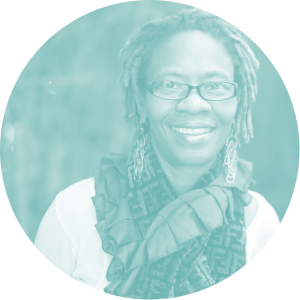 “There are a lot of people hurting. Racism is seeping into the church because the church is too afraid to be confrontational. The church was the bedrock of the black community, so to not be at the forefront of conversations that matter to the community is not right. It’s a vacant hole that is not doing what God said: ‘feed my children.’ Movement toward justice should be launched from the church! Instead, we are not salt anymore; we are washed out.
“There are a lot of people hurting. Racism is seeping into the church because the church is too afraid to be confrontational. The church was the bedrock of the black community, so to not be at the forefront of conversations that matter to the community is not right. It’s a vacant hole that is not doing what God said: ‘feed my children.’ Movement toward justice should be launched from the church! Instead, we are not salt anymore; we are washed out.
“People won’t admit that there’s a problem. We need to be in conversation constantly, admitting that there is a problem when we don’t see each other as individuals, we see each other as ‘others.’ Once you have one great friend outside your race, you are doomed to never have the lie of racism again in your life. You can’t say, ‘all white people are . . . ’ anything! I have a friend—Rebecca: I can’t say ‘all white people . . . but not Rebecca. And not Toby.’ You can’t do it! So that is reconciliation for me: I know one [white brother or sister] exists. And if one exists, maybe two exist.
“We have to come together. That, if anything, is my reason for living: to put people at the same table to have a conversation who wouldn’t normally look at each other on the street. That’s important. You have to love your brother, and to do that, you have to hear your brother. That’s what we have to take on, because it’s God first and it’s God last.”
+ PJ Johnson is a Washingtonian (from DC) who has called Pasadena home for over 15 years. She is an MDiv student with an emphasis in international and urban development, and she wants to start a global conversation about God with marginalized peoples that can move them to be active agents in their own lives.
 “The African American community has been subjected to repeated interpersonal, cultural, institutional, and systemic forms of oppression that have marred identity and subjugated development. Minority communities suffer at the unjust hands of oppressive law enforcement. As this occurs, followers of Jesus stand by idle, passive, and neutral, hoping for God to bring justice, shalom, and restoration to each unique situation. The people of God must be conscious, informed, active, and engaged. It is an imperative that the love ethic of the people of God becomes an embodied, public practice.
“The African American community has been subjected to repeated interpersonal, cultural, institutional, and systemic forms of oppression that have marred identity and subjugated development. Minority communities suffer at the unjust hands of oppressive law enforcement. As this occurs, followers of Jesus stand by idle, passive, and neutral, hoping for God to bring justice, shalom, and restoration to each unique situation. The people of God must be conscious, informed, active, and engaged. It is an imperative that the love ethic of the people of God becomes an embodied, public practice.
“We must see that those who suffer at the hand of violence by those who occupy power and privilege continue to be caught in a toxic cycle. Those in power must fulfill the biblical imperative of peacemaking by using their privilege to contend and restore those at the bottom of society. God desires that we use the skills, talents, and abilities he has given us to engage actively and not remain passive to the plight of those around us. This must happen in our spheres of influence, top and bottom. A Spirit-led synergy needs to be cultivated within the cross-stitch of society that contends actively for the shalom of all people.”
+ Toby Castle graduated with a Master of Arts in Global Leadership in 2015. He is an educator and race advocate from Sydney, Australia.
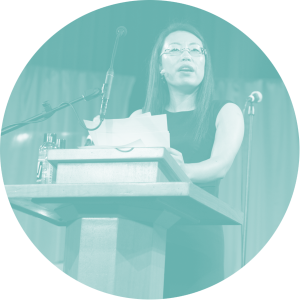 “The Book of Esther offers a valuable commentary on today’s globalizing world. The phenomenon of transnational, political, and economic interdependence generates uncertainty and confusion similar to what the citizens of Susa experienced. Esther serves as a careful warning against the catastrophic effects of consolidation and integration of power without a corresponding ethical framework. . . . The emerging world economic and political situation needs an ethical frame that matches the informational and technological advancements. Esther tells how an ancient version of modern-based globalization—that is, integration and expansion of transnational production, migration, communication, and technology—went awry when control of power was concentrated in an entity that was dangerously devoid of any ethical consciousness.”
“The Book of Esther offers a valuable commentary on today’s globalizing world. The phenomenon of transnational, political, and economic interdependence generates uncertainty and confusion similar to what the citizens of Susa experienced. Esther serves as a careful warning against the catastrophic effects of consolidation and integration of power without a corresponding ethical framework. . . . The emerging world economic and political situation needs an ethical frame that matches the informational and technological advancements. Esther tells how an ancient version of modern-based globalization—that is, integration and expansion of transnational production, migration, communication, and technology—went awry when control of power was concentrated in an entity that was dangerously devoid of any ethical consciousness.”
+ Kyong-Jin Lee is assistant professor of Old Testament studies in the School of Theology. Watch Dr. Lee’s full talk at the 2015 Fuller Forum here.
+ The Sacramento Tower Bridge was built to facilitate the entrance of heavy traffic into the capital city of California for commerce and a quick egress from it in case of war. Built in 1935, it was a major link in transcontinental highway 40, and was heralded with the release of 100 homing pigeons who carried the news throughout California. It spans the Sacramento River, the banks of which were the meeting place of an ecumenical coalition of religious leaders in the early “Wild West” days of Sacramento. They banded together across denominational lines to address the needs of the gold rush boom town, creating a unique heritage of diversity in the area, now being revitalized to address racial reconciliation through Fuller’s Micah Groups. (See the story here.)
 “Sabbath has to do not only with rest, but it has to do with ecology, with family, with neighbor—it’s all included. Yes, Freddie Gray is included; Freddie Gray’s memory is included. [Palestinian martyr] Deacon Romanus’s memory is included. All those that are within your immediate circle are particularly included. It’s so easy to get caught up with justice as outside of the home that we forget the people we sleep next to and share a bed with. Justice ought to begin at home, but it does not stay there because you cannot keep the fourth commandment in a cave. You can keep the Sabbath as long as you are in relationships. God’s command to keep the Sabbath reminds us of the irreducible, inscrutable, and relational nature of God’s demand on Christians and the world—an ecological community with a Christian oikos that creation-driven Sabbath rest demands of Christianity.”
“Sabbath has to do not only with rest, but it has to do with ecology, with family, with neighbor—it’s all included. Yes, Freddie Gray is included; Freddie Gray’s memory is included. [Palestinian martyr] Deacon Romanus’s memory is included. All those that are within your immediate circle are particularly included. It’s so easy to get caught up with justice as outside of the home that we forget the people we sleep next to and share a bed with. Justice ought to begin at home, but it does not stay there because you cannot keep the fourth commandment in a cave. You can keep the Sabbath as long as you are in relationships. God’s command to keep the Sabbath reminds us of the irreducible, inscrutable, and relational nature of God’s demand on Christians and the world—an ecological community with a Christian oikos that creation-driven Sabbath rest demands of Christianity.”
+ Johnny Ramírez-Johnson is professor of intercultural studies. Watch Dr. Ramírez-Johnson’s full talk at the 2015 Fuller Forum here.
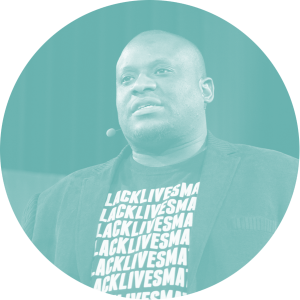 “How many of you know we rarely make any kind of a change unless we have a crisis? How can you and I create moral and theological crises where we will all be asked to answer the age-old question that many freedom fighters before us have put into the public imagination: ‘Which side are you on? Are you on freedom’s side? Or are you on the side of status quo that is necessary to undergird bondage and oppression?’
“How many of you know we rarely make any kind of a change unless we have a crisis? How can you and I create moral and theological crises where we will all be asked to answer the age-old question that many freedom fighters before us have put into the public imagination: ‘Which side are you on? Are you on freedom’s side? Or are you on the side of status quo that is necessary to undergird bondage and oppression?’
“Our congregations must reimagine ourselves as more than a house for weekly worship. Our seminaries must become formation pipelines for pastors and Christian leaders who are freedom fighters and champions of liberation of not just the soul but also the body. Can we embrace the notion of our institutional body as a power basis of redemption and agency that can be leveraged to invent and create?. . . What does it mean to create a hope-filled present and future for marginalized people so we may see the kingdom of God on earth as it is in heaven? Can we preach, pray, and act in ways that disciple our congregants to be open and willing to put their own personal bodies in the fight for freedom through principled nonviolent direct action, mentoring, protest, or any form of physical engagement? You can flip the television with the remote control, critiquing and criticizing and dehumanizing angry, hurting, and traumatized young people who burn down a store, but you can’t put your body in the game to help them put out the fire that is burning down their lives? Clergy, seminaries, ongoing Christian education programs must develop a robust theology that collapses the false dichotomy between biblical understandings of righteousness and justice.
“Seeking justice in my city has been an act of love that flows from a deep relationship with Christ but also a source of personal transformation as I dare to go upstream seeking to do justice. For through the ministry of justice God has shown me that for many social conditions that I’ve asked him in prayer to change, he often changes me and then empowers me to be an agent of change to transform these circumstances. Never forget, brothers and sisters, that the first act of revolution will always be internal—a revolution of our hearts, a revolution of our values, a revolution of our minds, a revolution of our ideas about who matters, who belongs to us, who is our neighbor, who we’re willing to listen to, who is our family, and what is my responsibility to leverage my power, my resources, and my agency on their behalf.”
+ Michael McBride is pastor of The Way Christian Center in West Berkeley, California. Watch his full talk at the 2015 Fuller Forum here.
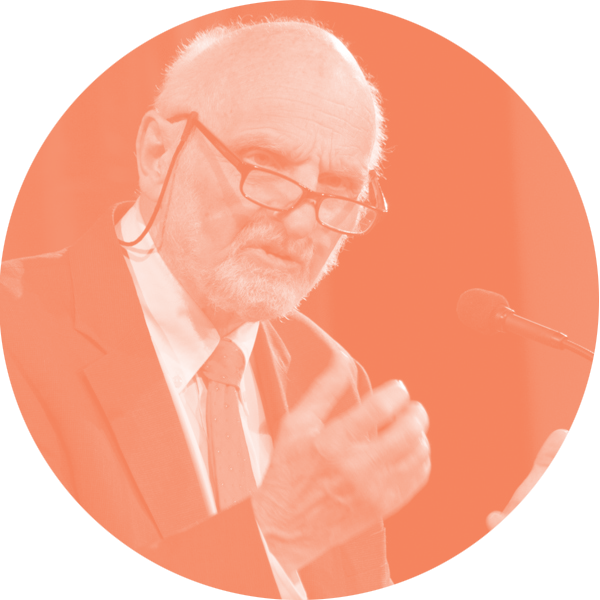 “This reach towards the Other does not constitute an abandonment of the self, so in God’s reach toward the Other, God does not abandon God’s own self. And there is evidence in many places of the Old Testament that God’s self-regard overrides the Other because God will not be mocked or trivialized or cheapened. But this reach towards the Other means that the relationship out of which we get justice, grace, and law is always about othering. So the Other in the Bible is the widow, the orphan, and the immigrant—those who were vulnerable and needed protection of an economic kind. So in Deuteronomy 10 God says through Moses, ‘Love the stranger—the sojourner—because you were strangers in Egypt.’ Or othering means to reach, in Isaiah 56, to eunuchs and foreigners for God’s sake. Or even other nations in the belated texts of the prophetic tradition. And when we look into the New Testament, I suspect the most demanding and difficult and important decision made in the New Testament church was the boldness of opening the baptismal community to the Gentiles [those of whom] God says ‘do not call them unclean those whom I have made clean.’ So the mission of the church is always to be reaching to the next order of Gentiles—to the next order of people who really repel us and we wish we didn’t have to deal with them and you wouldn’t want your daughter to marry one of them—and they turn out to be our co-conspirators in the gospel.”
“This reach towards the Other does not constitute an abandonment of the self, so in God’s reach toward the Other, God does not abandon God’s own self. And there is evidence in many places of the Old Testament that God’s self-regard overrides the Other because God will not be mocked or trivialized or cheapened. But this reach towards the Other means that the relationship out of which we get justice, grace, and law is always about othering. So the Other in the Bible is the widow, the orphan, and the immigrant—those who were vulnerable and needed protection of an economic kind. So in Deuteronomy 10 God says through Moses, ‘Love the stranger—the sojourner—because you were strangers in Egypt.’ Or othering means to reach, in Isaiah 56, to eunuchs and foreigners for God’s sake. Or even other nations in the belated texts of the prophetic tradition. And when we look into the New Testament, I suspect the most demanding and difficult and important decision made in the New Testament church was the boldness of opening the baptismal community to the Gentiles [those of whom] God says ‘do not call them unclean those whom I have made clean.’ So the mission of the church is always to be reaching to the next order of Gentiles—to the next order of people who really repel us and we wish we didn’t have to deal with them and you wouldn’t want your daughter to marry one of them—and they turn out to be our co-conspirators in the gospel.”
+ Walter Brueggemann is an Old Testament theologian and professor emeritus of Old Testament at Columbia Seminary. He was the featured speaker for the 2015 Fuller Forum. Watch all of his talks here.
+ The Colorado Street Bridge (1912) was built to ease the arduous crossing of the Arroyo Seco from Pasadena to Eagle Rock and is within walking distance of Fuller’s Pasadena campus. Its unique, pedestrian-friendly design attracts artists, lovers, and the melancholy—with over 150 suicides since it was built. (Charlie Chaplin’s film City Lights begins with the Little Tramp talking a millionaire out of jumping to his death from this bridge.) This illustration imagines all that Fuller has worked toward in the 70 years of its history in Pasadena, as well as our hopes for promoting future reconciling work of the gospel. Whether we march in Pasadena, Phoenix, or Atlanta, we take steps toward justice with every choice to see the invisible person, hear the imprisoned voice, or feel the undercurrent of sorrow that, by ignoring, undermines reconciliation.

